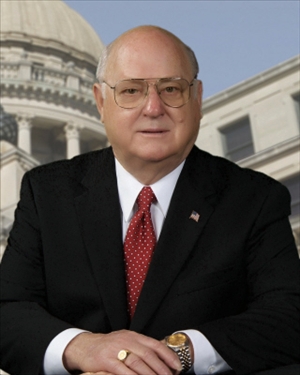

AP file photo
JACKSON, Mississippi (AP) — A majority of Mississippi House members voted willingly last week to limit their own power of speech in their own chamber by eliminating something called the point of personal privilege.
The decision was an astonishing turn of events led by Republican House Speaker Philip Gunn and his allies, and the change came in response to Democrats requesting that bills be read aloud as a delay tactic. Democrats were protesting what many black lawmakers saw as unfair or dismissive treatment of their concerns by Gunn since the GOP gained a three-fifths supermajority this year.
A point of personal privilege is a type of speech typically used only a few times in the House and Senate each year. It allows legislators to go to the front of the chamber and speak if they think their integrity has been impugned or if they question the way legislative business is being conducted.
Legislators have used points of personal privilege to publicly apologize after being charged with DUI, to apologize to colleagues for providing too little information about bills that became controversial, or even to thank people for prayers and support after injury or illness.
The speeches have been permitted in the Mississippi Legislature since “time immemorial,” Democratic Rep. Ed Blackmon of Canton said Thursday night during a 26-minute point of personal privilege — one that looked like it might be the last in the chamber.
The House and Senate set their own operating rules at the start of each four-year term, and it’s highly unusual to change rules once they’re set.
It took a machine-generated voice all of Thursday afternoon and part of the evening to read aloud a 293-page bill at the request of Democrats. After that, the Republican-led Rules Committee met and voted to recommend that the House eliminate points of personal privilege. The speeches can also be used to delay debate.
The House voted 71-50, mostly along party lines, to eliminate personal privilege. All Democrats opposed the change, and all but two Republicans supported it. The exceptions were freshmen GOP Reps. Joel Bomgar of Madison and Ashley Henley of Southaven.
The vote came despite a warning from Democratic Rep. John Hines of Greenville to his Republican colleagues that either party could be hurt.
“Today, it’s us,” Hines said. “Tomorrow, it’s you.”
In the Mississippi House, not all Democrats are black, but all black representatives are Democrats.
Blackmon, a Legislative Black Caucus member in office since 1979, said he was struck by a change in the House chamber this year. For the first time, the electronic boards that display how members vote are divided by party, with Democrats on the left and Republicans on the right. Blackmon also noted that the change mostly segregates black and white.
He said that unless all members are allowed to fairly participate in the legislative process, every bill will be tainted.
“It won’t be accepted as being legitimate,” Blackmon said. “It will be seen as politics of Mississippi as usual.”
The House accomplished little Thursday and Friday because of conflict between Republican leaders and the Black Caucus. Before representatives left for the weekend, Gunn said a peace agreement had been reached, and it included a promise to restore points of personal privilege. The House must vote on the change.
“This is normal legislative stuff. This is not an alarm,” Gunn told reporters. “This is the kind of stuff we deal with about once a year, and we always work it out and we always move on.”
Except one detail about this conflict doesn’t happen every year. In at least two decades, neither chamber has tried to revoke personal privileges.




Be the first to comment